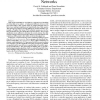Free Online Productivity Tools
i2Speak
i2Symbol
i2OCR
iTex2Img
iWeb2Print
iWeb2Shot
i2Type
iPdf2Split
iPdf2Merge
i2Bopomofo
i2Arabic
i2Style
i2Image
i2PDF
iLatex2Rtf
Sci2ools
INFOCOM
2000
IEEE
2000
IEEE
Effort-limited Fair (ELF) Scheduling for Wireless Networks
— While packet scheduling for wired links is a maturing area, scheduling of wireless links is less mature. A fundamental difference between wired and wireless links is that wireless media can exhibit substantial rates of link errors, resulting in significant and unpredictable loss of link capacity. This capacity loss results in a special challenge for wireless schedulers. For example, a Weighted Fair Queue (WFQ) scheduler assumes an error-free link and specifies how flows should share the link capacity. However, this specification is not sufficient to determine the correct outcome when link capacity is sharply reduced, because flows that have been allocated the same weights may differ greatly in their ability to tolerate throughput loss. In this paper, we first describe the wireless scheduling challenge in terms of an effort-outcome disconnection. Next we propose a novel notion of fairness for wireless links, effort-limited fairness (ELF), which extends WFQ via dynamic weight ...
| Added | 31 Jul 2010 |
| Updated | 31 Jul 2010 |
| Type | Conference |
| Year | 2000 |
| Where | INFOCOM |
| Authors | David A. Eckhardt, Peter Steenkiste |
Comments (0)

